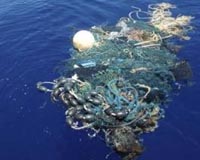| . |  |
. |
Lagos (AFP) Jan 7, 2011 The UN warned on Friday that an outbreak of lead poisoning due to illegal gold mining in northern Nigeria believed to have killed more than 400 children remained an "alarming" risk. The 400 children under the age of five have died in several villages in Zamfara state since early 2010, according to the Doctors Without Borders non-governmental organisation. UN officials dispatched a team to the area to investigate the health crisis and their report was released on Friday. "Until complete remediation of polluted villages takes place, and as long as ore processing continues in sensitive areas -- home compounds and villages, wells and ponds used for drinking water by humans and livestock -- there remains an alarming, continuing health risk," the report said. The joint team from the UN Office for the Coordination of Humanitarian Affairs and the UN Environment Programme recommended methods of reducing risks in the area that result from wildcat mining. "High levels of lead pollution were found in the soil, and mercury levels in air were determined to be nearly 500 times the acceptable limit," the UN said. Lead has been dispersed in the villages by the processing of ore for gold extraction. "Ingestion and inhalation of the fine lead particles was determined to be the major reason for high blood lead levels in victims' bodies," the report said. "Blood lead levels were 'unprecedented' for human beings, according to the CDC," it added, referring to the US Centers for Disease Control and Prevention. The UN urged Nigeria to do more to clean up villages to prevent further deaths. "At the time of this mission, only two villages had been remediated, and the list of villages suspected to be contaminated continued to grow," the report said. "Efforts to temporarily settle children in 'clean' villages that are not their own have had limited success." Local communities largely concealed or denied the fatalities and illnesses from lead poisoning for fear that authorities would ban their mining activities, a Doctors Without Borders official has said. Illicit gold mining is more lucrative than agriculture for the impoverished farming communities. "Given the reality of extreme poverty in Zamfara State, stopping mining operations without an alternative source of income is not realistic," the report said. "Focus should instead be placed on informing about and implementing safer practices; enacting stronger regulation; and establishing areas outside of villages where ore could be securely stored and safely processed without posing significant threats to human health and the environment."
Share This Article With Planet Earth
Related Links Our Polluted World and Cleaning It Up
 Oceanic "Garbage Patch" Not Nearly As Big As Portrayed In Media
Oceanic "Garbage Patch" Not Nearly As Big As Portrayed In MediaCorvallis OR (SPX) Jan 06, 2011 There is a lot of plastic trash floating in the Pacific Ocean, but claims that the "Great Garbage Patch" between California and Japan is twice the size of Texas are grossly exaggerated, according to an analysis by an Oregon State University scientist. Further claims that the oceans are filled with more plastic than plankton, and that the patch has been growing tenfold each decade since the ... read more |
|
| The content herein, unless otherwise known to be public domain, are Copyright 1995-2010 - SpaceDaily. AFP and UPI Wire Stories are copyright Agence France-Presse and United Press International. ESA Portal Reports are copyright European Space Agency. All NASA sourced material is public domain. Additional copyrights may apply in whole or part to other bona fide parties. Advertising does not imply endorsement,agreement or approval of any opinions, statements or information provided by SpaceDaily on any Web page published or hosted by SpaceDaily. Privacy Statement |